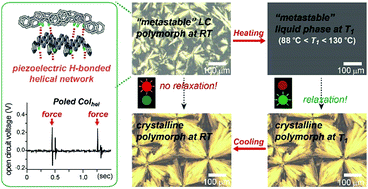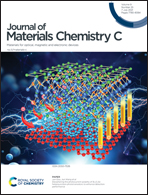Non-classical temperature-dependent phase sequence: long-lived metastable piezoelectric helical columnar liquid crystalline polymorph†
Abstract
Polymorphism is an intriguing research topic, because multiple functionalities can be accessed from a single material. Herein, we report the unusual polymorphic behavior of a liquid crystalline (LC) naphthalene derivative (1) based on 1,2,3-triazolyl linkages. Two individual polymorphs corresponding to metastable helical columnar (Colhel) LC and thermodynamically stable monoclinic crystalline (Cry) phases can be obtained at room temperature by mild thermal treatments. According to the thermal, dynamic, and structural analyses of 1, the triazolyl H-bonded network along the columnar axis plays a key role in the formation of the polar helical columnar order and its longevity. As a consequence of the remarkable stability of the metastable Colhel, a non-classical phase sequence, that is, Colhel–liquid–cry–liquid upon heating, was observed for the first time, although it was also predicted theoretically in monotropic LC polymorphism. Interestingly, piezoelectric measurement of the poled Colhel polymorph showed a noticeable increase in open-circuit voltage upon the application of force, which was more than five times greater than the measured voltage of the Cry polymorph.



 Please wait while we load your content...
Please wait while we load your content...